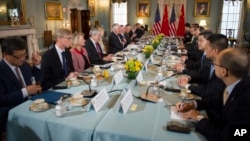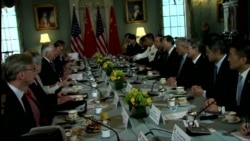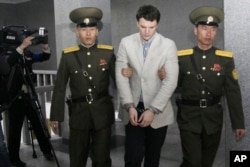The United States pushed China during high-level security talks on Wednesday to step up diplomatic and economic pressure to rein in the Kim Jong Un regime in North Korea, but defense analysts said Washington may have to lower its expectations, due to Beijing’s strategic relationship with Pyongyang.
“China understands that the United States regards North Korea as our top security threat,” said Secretary of State Rex Tillerson. "We reiterated to China that they have a diplomatic responsibility to exert much greater economic and diplomatic pressure on the regime if they want to prevent further escalation in the region.”
Watch: Top Chinese, US officials kick off strategic talks in Washington
“Whether it is money laundering, extorting Korean expatriates, or malicious cyberactivity, North Korea has engaged in a number of criminal enterprises that help fund its weapons programs," the top American diplomat added. "We must step up our efforts to help curtail these sources of revenue."
North Korea topped the agenda at the talks Wednesday after a U.S. student who had been imprisoned by the communist country died this week after being returned to his family.
Tillerson, Mattis Represent US
The first round of the U.S.-China Diplomatic and Security Dialogue included Tillerson and Defense Secretary Jim Mattis from the U.S. side, meeting with China's State Councilor Yang Jiechi and General Fang Fenghui, chief of the People's Liberation Army's joint staff department.
President Donald Trump has lauded China's past efforts to rein in North Korea, but he acknowledged in a tweet on Wednesday that those efforts have not achieved the desired results. His comments followed the death on Monday of Otto Warmbier, 22, who was returned to U.S. custody in a coma after nearly 18 months of imprisonment by North Korea on a minor charge.
"While I greatly appreciate the efforts of President Xi & China to help with North Korea, it has not worked out. At least I know China tried!" Trump wrote on Twitter.
Mattis said President Trump “represents the American people’s view of North Korea right now.”
Regime 'Plays Outside the Rules'
“This goes beyond any kind of understanding of law and order, of humanity, of responsibility toward any human being,” Mattis said. Americans are frustrated, he continued, with “a regime that provokes, and provokes, and provokes, and basically plays outside the rules, plays fast and loose with the truth.”
Deputy Secretary of State John Sullivan and Special Representative for North Korea Policy Joseph Yun, the U.S. diplomat who traveled to North Korea to secure Warmbier's release, plan to attend his funeral in Ohio on Thursday.
In Beijing, Chinese Foreign Ministry spokesman Geng Shuang said on Wednesday that China has been trying continuously to resolve the North Korean nuclear crisis, and that its efforts have always been "important and constructive.”
The United Nations has blacklisted hundreds of North Korean entities, but many of them try to get business done through China, according to U.S. officials. The issue is a sticking point between Washington and Beijing that many experts say deserves frank discussion.
“China might be willing to make changes on the margins of its relationship with North Korea, but fundamental changes to its strategy are highly unlikely, because this would threaten the stability of Kim Jong-un's regime and potentially eliminate the North as a buffer state,” Rand Corporation senior defense analyst Derek Grossman said.
Grossman said Beijing’s strategic calculus about North Korea should temper Washington’s expectations of what Trump administration policy can achieve.
The Rand analyst said China's perpetual security concern is reflected in its proposal that the U.S. and South Korea “freeze” routine joint exercises, in exchange for Pyongyang suspending its missile and nuclear programs.
Tufts University Korean analyst Sung Yoon-Lee said U.S. diplomats have tried for 25 years to urge China to pressure North Korea, but that those efforts have largely fallen on deaf ears.
"China needs to be presented with some economic disincentives, some costs," he said. "Moral suasion in itself will get nowhere."










